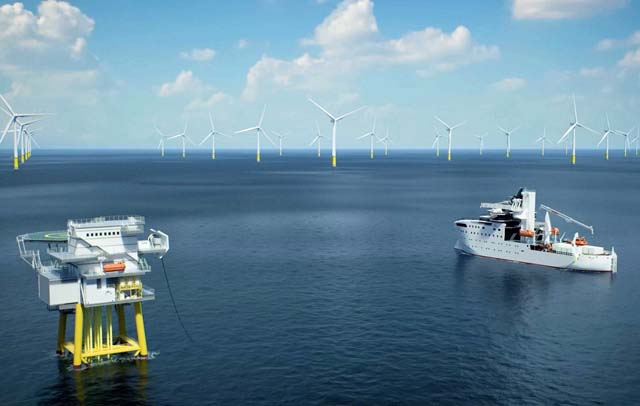Vard Electro is driving progress towards realisation of fully electric service operation vessels (SOVs) by putting in place offshore charging stations alongside existing onboard technologies to facilitate zero-emission maintenance operations at offshore wind farms.
The company sees battery-driven power and propulsion systems as the optimal solution to minimise the environmental footprint of SOVs in response to strong regulatory and commercial drivers for construction of battery-powered ships. Such factors include the increased cost of using fossil fuels as a result of implementation from 2024 of the EU Emissions Trading System (EU ETS) for shipping that ultimately could include offshore vessels, as well as more stringent global emissions regulations such as CII.
Øystein Longva, CTO Vard Electro said: “While the initial Capex for a battery-powered SOV is relatively high, this will deliver commercial benefits in the longer term due to higher costs for emissions and improved energy efficiency that cuts operational expenses.”
Vessels running on battery power can improve seakeeping and manoeuvring performance due to a more dynamic response capability. They also require less maintenance as there are no moving engine parts, which reduces noise and vibration.
With major advances in battery technology, such as optimised lithium-ion batteries for energy density, lifecycle, cold weather performance, robustness and safety, as well as significant cost reduction.
Vard Electro is able to deliver energy storage as well as power management and automation systems as part of its SeaQ product range. It is now addressing the final technical obstacle – offshore charging – through its joint leadership of the industry research project Ocean Charger, which, to test, validate and commercialise new technological solutions for energy transfer to offshore battery-powered vessels and lay the groundwork for green maritime infrastructure as part of future wind development.
A full-scale test of the offshore charging solution is planned for early 2024 and Vard Electro is looking to take orders for charging stations in 2024.
Vard Electro has opted for high-voltage AC charging with 11kV as the optimal offshore charging solution as this can deliver increased energy with reduced size and number of cables compared with DC sources, giving one day of operations from a three-hour charge at 6.3MW/h through a single cable.
However, elimination of diesel engines means the benefit of heat generation from engines to provide domestic heating needs will be lost, placing higher demands on battery capacity.
Energy batteries can provide an effective spinning reserve for DP operations and their cell chemistry provides higher energy density with higher kWh/m2, while the LTO and LFP chemical composition of energy batteries is safer with less turbal runaway than power batteries using NMC (Nickel Manganese Cobalt Oxide) cathodes.
Longva said: “There are safety challenges with offshore charging, particularly with hazards related to connection and disconnection of power cables in rough weather and high sea states.”
These should be largely resolved through testing, as, according to Longva, this is a familiar concept in the offshore sector, where shuttle tankers have been bunkering with buoy-loading operations for years.
Fully electric SOVs will most likely have an onboard back-up energy reserve in case of not being able to recharge at sea, so there will be a need for emergency gensets running on alternative fuels such as methanol, hydrogen or ammonia, or alternatively hydrogen fuel cells. Safety and storage considerations, as well as high cost of fuel cells, mean that methanol is the most likely reserve fuel.
Longva concluded: “Development of offshore charging infrastructure will provide an important pathway to incentivise investments by shipowners in fully electric SOVs and thereby accelerate newbuilding activity in this shipping segment.”



